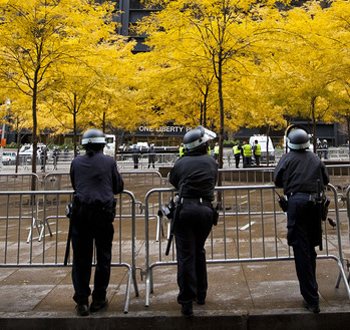
“Is it mere coincidence that we have been served eviction notices at the same time that riot police are clearing out the occupations in Wall Street, Oakland, Dallas, Atlanta, Vermont, Denver, Oregon and Salt Lake City?” asks one Occupy London Stock Exchange protester. “And is it mere coincidence all this is happening a week before the US deadline to slash $1.2 trillion off the Federal deficit?” The questions are rhetorical but as the deadline for protesters to remove their tents passes and news trickles in of violent demonstrations in New York, Athens and across Italy, the mood at the occupy camp outside St Paul’s Cathedral in London is suitably defiant.
The eviction notices, served by bailiffs on November 16th on behalf of the City of London Corporation and addressed to “each and every person taking part in and/or having erected tents or other structures at St Paul’s Cathedral”, warned protesters that unless they had removed their tents by 6pm that night “injunctions will be issued in the High Court.” Although legal proceedings are likely to take some time and will be complicated by the fact that the order only applies to tents on the “public highway” not to those on property owned by the church, the eviction notices are nevertheless symbolically significant.
The occupation at St Paul’s Cathedral has achieved a huge amount in the space of a month. It has generated massive public and media interest and sparked a national conversation in Britain on not just about the nature of our economic system but also about morality and the type of society we want to live in. It has galvanized the Church of England sparking a crisis of faith among some of its members and forcing its leaders to publicly reaffirm their commitment to the principles of equality and fairness. It has attracted the support of trade unions and the acknowledgement of senior British politicians including opposition leader Ed Miliband and government minister Vince Cable as well as helping to expose the City of London Corporation as the most undemocratic institution in UK local government. No surprise perhaps that it was that corporation which served the protesters with their eviction notice.
In New York it was Mayor Bloomberg who authorized the police to clear the Occupy Wall Street protesters from Zuccotti Park after nearly two months. The American occupy movement has had a massive impact, tapping into a groundswell of frustration and anger and attracting widespread mainstream support. It has garnered high profile endorsements from politicians, academics and celebrities including the support of Joe Biden, Al Gore and Democratic House Minority Leader Nancy Pelosi. And yet, might the very success of the Occupy Movements have reinforced the determination of the authorities to dismantle the protest camps?
On November 23rd the US Joint Select Committee on Deficit Reduction appointed to review the $1.2 trillion of cuts needed to reduce the US deficit, will present its report. If, as some financial analysts predict, they fail to come up a strategy to slash the deficit, the ratings agencies might downgrade the US credit rating triggering a substantial fall in the stock market. Savage budget cuts would also be likely to have severe effects on the economy. Either way, ordinary Americans are likely to suffer and there would be a domino effect around the globe. Were the current recession to slip into all-out depression the Occupy Movements would become a natural home for disillusioned and the dispossessed: the so-called 99 percent.
When I was in Zuccotti Park last month a policeman expressed his certainty that the protesters would move on with the change of seasons. “If you’ve ever felt a New York winter,” he said, “you’ll know what I’m talking about.” And yet despite the rain and snow and plummeting temperatures, the occupation in Wall Street continued. Despite the tear gas, flash grenades and rubber bullets the occupation in Oakland continued. What will happen in London and other occupations around the world in the coming weeks and months remains to be seen. In any event, the Occupy movement is about much more than camping in parks; the concerns that the movement is articulating are unlikely to go away anytime soon.
Stefan Simanowitz is a writer, journalist and broadcaster. www.simanowitz.ning.com. He spent a week with the protesters in Zuccotti Park in early October and has been visiting St Paul’s since the first day of the occupation.
